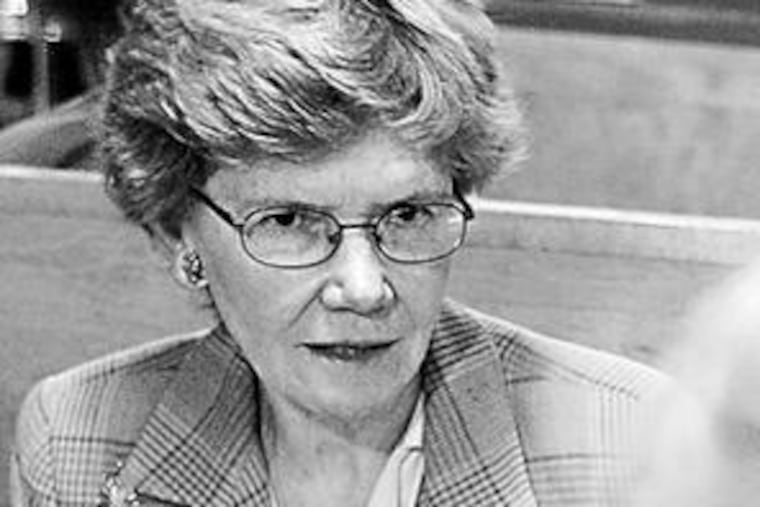
Feather Houstoun was a top-tier public servant on both sides of the Delaware, having been Pennsylvania's secretary of public welfare and New Jersey's state treasurer. She's also been SEPTA's chief financial officer.
She road-tripped with the Economy League's Leadership Exchange to Chicago in 2005 and Atlanta this year with dozens of business, nonprofit and civic leaders to pick those cities' brain trusts for best practices to try out here. The William Penn Foundation helps fund the exchange.
Her vision for the regional economy 10 years from now:
A happier whole that finally attracts venture capital.
"When you think of eds, meds and pharma as the foundational elements of our economy, combined with our location on the East Coast and with Amtrak right in the middle of it, we have tremendous opportunities - particularly in a carbon-constrained world.
"So our position in terms of being very, very competitive as a region is great, provided we do the right things now. Most of the investments that are really game-changing have to be sustained and have to mature to reach some payoff further down the road.
"I would put those in a number of categories, the first being attitudinal - that is, understanding that we are a region, that we're competing as a region and that we have to think as a region.
"In Chicago, that is perhaps the most interesting aspect of the way people describe themselves. Even though you think the place is sort of dominated by Rich Daley, you start talking to small-town mayors all over that region, and they think they're part of the region, and they think they've got a piece of the action.
"It's also important to be looking at the assets we have and making certain that they are both nurtured and seen as assets. SEPTA and PATCO - and Amtrak, for that matter - are absolutely central to our future. They need the investments that are going to make them modern.
"The other asset that is not fully exploited is the commercialization of our university research - particularly in bio-med. It's been talked about a great deal, but it's really not reached liftoff at the volume and with the power that it could.
"And I know the CEO Council is working very hard on this, and I am seeing for the first time a lot more cooperation - people at the same table with the same objectives and not so much 'We can't do that.'
"As an example, the CEO Council had a subcommittee asking: 'Where's the venture capital in this region?' And what they learned was that if you have things ready to finance, venture capital shows up. The real failure to lift off here has to do with earlier-stage development - that is, at prepatent level. So figuring out how to create incentives for developing and nurturing and getting to the patent stage is something we have to work on.
"Sustainability is another basis for the region to work together, whether it's transit or another energy-related issue. It's almost as though some of the doors that have been shut are opening up - all the little rooms, the fragmented nature of the region. People are seeing what advantages there might be looking at things much more collaboratively.
"And I think that as traumatic as the economics of the future year or two or three might be, sometimes that kind of stress forces people to get down to the basics of what they need to do to get the job done and less-concerned with drawing up barriers.
"Even though it will undoubtedly be a very painful period, we may see situations where people say, 'You know what? This really isn't worth arguing about. Let's figure out where we can agree and move forward.' "
Three steps to get there.
1. Help the trains run in sync. "Supporting a really comprehensive and strategic plan for transit - both SEPTA and PATCO and to some extent Amtrak - is very important," Houstoun said.
2. Make government ethics and transparency the new normal. "It's not what one administration does," Houstoun said. "It's setting a habit of behavior that is sustained across administrations."
3. Learn to disagree without being disagreeable. "Atlanta has its terrible congestion and lots of problems. But I think the group we took there was impressed with people's sense of humor - with their self-awareness of their conflicts and with their ability to laugh at their differences, and with everything not being an angry exchange.
"Their openness to deal with their differences was really impressive," Houstoun said, "whether it was issues of race or the suburbs vs. the city. People say they're so prosperous that they don't have time to hate. I think it just takes leadership.
"I have a lot of optimism about that. We can't be Georgians. You can't transplant personality. But I do think we can learn."